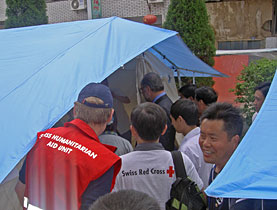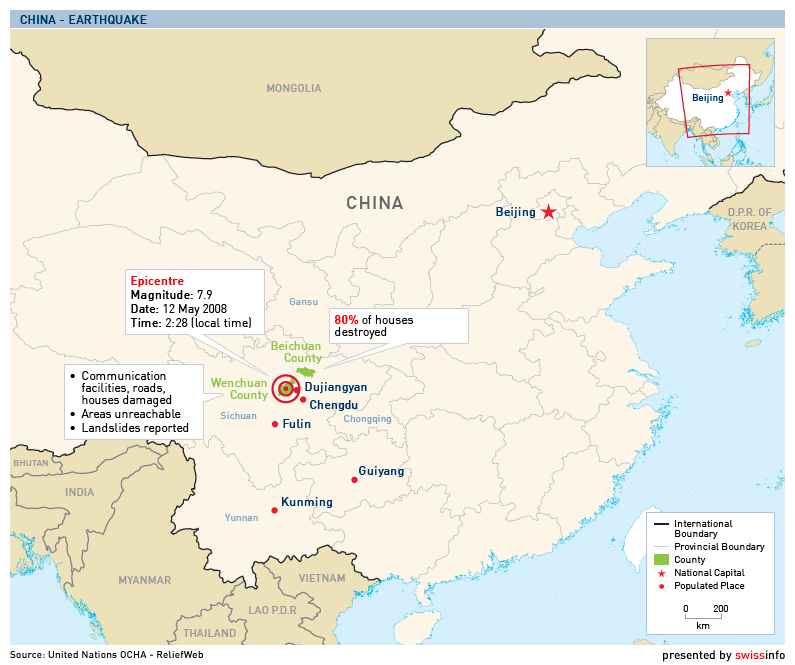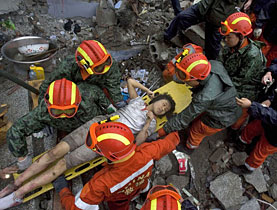Much work remains to be done in China

The Swiss Agency for Development and Cooperation (SDC) and the Swiss Red Cross have sent more than 1,000 tents to the earthquake-struck region of China.
Markus Hischier, head of technical logistics at the SDC’s Humanitarian Aid Unit, returned from China on Monday and says steady progress is being made. But a massive amount of work remains to be done.
“It’s impossible to say when normality will return,” Hischier told swissinfo on Tuesday.
“It will certainly take more than a year because up to 70 per cent of some towns are uninhabitable – the buildings haven’t collapsed but the structural damage means people can’t live in them. Everything will have to be taken down and rebuilt.”
The confirmed death toll for China’s worst disaster in three decades was raised on Tuesday to 69,107 – an increase of about 90 from the previous day, with more than 18,200 people still missing. The quake on May 12 has left five million people homeless.
Hischier said the victims’ priority need – besides water, medicine and food – is emergency accommodation. The SDC and the Swiss Red Cross responded to a request from the Chinese government by sending 1,050 tents and four experts to the devastated area.
These tents, measuring up to 20 square metres, will provide shelter for 6,000-8,000 people. On their arrival in Chengdu on May 29 they were handed over to the Chinese Red Cross whom Swiss experts helped erect the tents.
The SDC also sent six 56-square-metre multi-purpose tents that can be used as temporary medical dispensaries, schools or storage space.
“The situation for the homeless is obviously very serious,” Hischier said. “There is the danger of an afterquake and people are very scared. But astonishingly the population is also very calm and very disciplined.”
Quake lakes
One SDC/Red Cross consignment of relief supplies has already been financed out of initial emergency funding, enabling the purchase and delivery of 20,000 water canisters, 6,000 tarpaulins and 20,000 blankets to the Chinese Red Cross in the earthquake-ravaged Sichuan province.
“Hygiene is also an issue,” Hischier added. “Supplying medicine is a big problem and so is schools.”
President Hu Jintao and other top leaders have been shown repeatedly on state television visiting children in makeshift schools. The Chinese government says the earthquake destroyed 7,000 classrooms.
Meanwhile, the official Xinhua News Agency said authorities have delayed for two days a bid to divert water from a huge lake formed when the quake sent landslides tumbling into a river in northern Sichuan.
Water levels in the lake had been rising steadily and threatened to flood surrounding areas, prompting authorities to evacuate nearly 200,000 people already uprooted by the quake.
But Xinhua said with little rain forecast for several days, rescue workers were not likely to start draining off the water until Thursday. The work had been expected to start on Tuesday.
Workers have already used heavy earth-moving equipment to dig a runoff channel to remove the water. The government is worried the newly formed lake could burst, sending a wall of water through a valley.
Swiss expertise
The Swiss foreign ministry has contacted the Chinese embassy in Bern with the offer of sending geologists, environmental specialists and dam construction engineers to mitigate secondary damage, for example breached dams.
“We have the knowledge and know-how concerning these lakes; we have experienced geologists in this field at our disposal,” Hischier said.
The SDC’s experts in the field are now assessing developments and evaluating what Switzerland can and should contribute in the future.
swissinfo, Thomas Stephens
A quake measuring 7.9 on the Richter scale struck Wenchaun County in China’s Sichuan Basin at 2.28pm Beijing time (6.28pm) on May 12.
The earthquake struck 29km below the earth’s surface, with the epicentre located 92 kilometres from Chengdu, the provincial capital.
At 2.35pm, an aftershock measuring 3.9 on the Richter scale hit Tongzhou District in eastern Beijing.
Tremors were reported throughout China and as far away as Bangkok, the capital of Thailand, and in Vietnam.
According to the Chinese government on June 3, 69,107 people had died, more than 18,200 were missing and five million were homeless.


In compliance with the JTI standards
More: SWI swissinfo.ch certified by the Journalism Trust Initiative













You can find an overview of ongoing debates with our journalists here . Please join us!
If you want to start a conversation about a topic raised in this article or want to report factual errors, email us at english@swissinfo.ch.